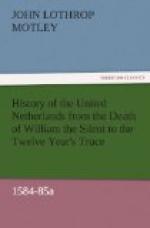On the 9th June the league demanded a royal decree, forbidding the practice of all religion but the Roman Catholic, on pain of death. In vain had the clear-sighted Bishop of Acqs uttered his eloquent warnings. Despite such timely counsels, which he was capable at once of appreciating and of neglecting, Henry followed slavishly the advice of those whom he knew in his heart to be his foes, and authorised the great conspiracy against Elizabeth, against Protestantism, and against himself.
On the 5th June Villeroy had expressed a wish for a very secret interview with Mendoza, on the subject of the invasion of England.
“It needed not this overture,” said that magniloquent Spaniard, “to engender in a person of my talents, and with the heart of a Mendoza, venom enough for vengeance. I could not more desire than I did already to assist in so holy a work; nor could I aspire to greater honour than would be gained in uniting those crowns (of France and Spain) in strict friendship, for the purpose of extirpating heresy throughout Europe, and of chastising the Queen of England—whose abominations I am never likely to forget, having had them so long before my eyes—and of satisfying my just resentment for the injuries she has inflicted on myself. It was on this subject,” continued the ambassador, “that Monsieur de Villeroy wished a secret interview with me, pledging himself—if your Majesty would deign to unite yourself with this King, and to aid him with your forces—to a successful result.”
Mendoza accordingly expressed a willingness to meet the ingenuous Secretary of State—who had so recently been assisting at the banquets and rejoicings with Lord Derby and his companions, which had so much enlivened the French capital—and assured him that his most Catholic Majesty would be only too glad to draw closer the bonds of friendship with the most Christian King, for the service of God and the glory of his Church.
The next day the envoy and the Secretary of State met, very secretly, in the house of the Signor Gondi. Villeroy commenced his harangue by an allusion to the current opinion, that Mendoza had arrived in France with a torch in his hand, to light the fires of civil war in that kingdom, as he had recently done in England.
“I do not believe,” replied Mendoza, “that discreet and prudent persons in France attribute my actions to any such motives. As for the ignorant people of the kingdom, they do not appal me, although they evidently imagine that I have imbibed, during my residence in England, something of the spirit of the enchanter Merlin, that, by signs and cabalistic words alone, I am thought capable of producing such commotions.”
After this preliminary flourish the envoy proceeded to complain bitterly of the most Christian King and his mother, who, after the propositions which they had made him, when on his way to Spain, had, since his return, become so very cold and dry towards him. And on this theme he enlarged for some time.




